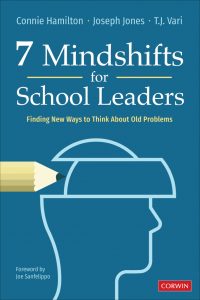
Season 5, Episode 18 of the FocusED School Leadership Podcast with Guest Minette Norman
Becoming an Inclusive Leader with Minette Norman
This is Season 5, Episode 18 of FocusED, and it features our guest, Minette Norman; in this episode, we’re focused on what it means to be an inclusive leader and how leaders can learn to create psychological safety for the people they seek to serve.
______________________________________________________________
Minette Norman Brings a Tons of Experience to FocusED Listeners
Minette Norman is an award-winning author, speaker, leadership consultant, and former Silicon Valley software executive who spent decades leading global teams.
Minette knows that when groups embrace diversity in all its forms, breakthroughs emerge, and innovation accelerates. Her most recent position before starting her consultancy was as Vice President of Engineering Practice at Autodesk. Responsible for influencing more than 3,500 engineers around the globe, she focused on state-of-the-art engineering practices while nurturing a collaborative and inclusive culture.
As the author of The Boldly Inclusive Leader and the co-author of The Psychological Safety Playbook, Minette is committed to helping leaders unleash the full potential of the people in their organizations.
Named in 2017 as one of the “Most Influential Women in Bay Area Business” by the San Francisco Business Times and as “Business Role Model of the Year” in the 2018 Women in IT/Silicon Valley Awards, Minette is a recognized leader with a unique perspective.
Minette holds degrees in Drama and French from Tufts University and studied at the Sorbonne Nouvelle in Paris.
FocusED Show Notes with Guest Minette Norman
When you retreat from discomfort, your learning stops. ~ Minette Norman
Minette starts by defining psychological safety. One key aspect is the ability to ask poignant questions and make critical comments without fear.
She mentioned the work of Amy Edmonson. When people feel psychological safety, they perform better at work.
Minette tells us that people do their best work when they feel that their voice is heard.
She tells us that leaders have to start with their own behaviors.
No matter how high up you are in the organization, a question that anyone can ask is “what am I missing?” We can’t assume that people will tell us what’s wrong or what we don’t see.
When people start telling us their perspective, we have to deliberately listen to understand versus listening to respond.
We’re cautioned not to be defensive as leaders because it diminishes psychological safety and, therefore, an open culture.
Minette tells us about a research study that reveals that employees want leaders who are empathetic.
We talked about empathy as a skill and the need to connect with people who aren’t like us.
Minette says that “the only way to grow as a leader is to become uncomfortable.” We have to be learners first. She tells us about times where she worked in cultures where she didn’t really understand the environment…yet.
Minette tells us a great story about leading engineers, all men, and not having been trained as an engineer.
We talked about daily habits, and Minette talked about doing something physical every day, even when she’s busy. She also describes the power of not getting backlogged and overwhelmed.
Minette ended with the power of self-awareness. Even if you’re not a leader, you still have an impact on the people around you.
Books/Resources We Recommend Based on this Podcast with Minette Norman
The Fearless Organization by Amy Edmondson
The Obstacle is the Way by Ryan Holiday
Tell Me More About That by Rob Volpe
Radical Collaboration by James Tamm and Ronald Luyet
Lean In Report on Women in the Workplace
________________________________________________________________
Related Content from TheSchoolHouse302
Our FocusED Interview with Todd Kashdan
________________________________________________________________
Thanks for listening to FocusED, an educational leadership podcast brought to you by TheSchoolHouse302 @ theschoolhouse302.com where we publish free leadership content. Go to the site and subscribe, and you’ll get all of our content sent directly to your email.
FocusED is your educational leadership podcast where our mission is to dissect a particular focus for teachers and school leaders so that you can learn to lead better and grow faster in your school or district. Let us know who you would like to hear from next.







 7 Mindshifts for School Leaders: Finding New Ways to Think About Old Problems.
7 Mindshifts for School Leaders: Finding New Ways to Think About Old Problems. 


